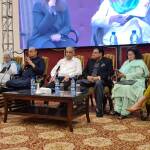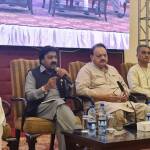LAHORE, Pakistan: A conference in connection with national minorities day emphasized the need to address religious intolerance and extremism based on abuse of religion.
The convention organized by the Centre for Social Justice (CSJ) was joined by representatives of the political parties and civil society organizations.
The human rights experts including Peter Jacob, Dr. Baela Raza Jamil, Khawar Mumtaz, Dr. A. H. Nayyar, Irfan Mufti, Nabila Feroze Bhatti and Albert David articled the issues that minorities face, while the political representatives including Minister Basharat Raja (PML-Q), MNA Lal Chand Malhi (PTI), Ijaz Alam Augustine (PML-N), MPA Bushra Anjum Butt (PML-N), MNA Waheed Alam Khan (PML-N), MPA Habqooq Gill (PTI) and MPA Yudester Chouhan (PTI) shared their party policy towards protection of minorities rights. Whereas, Kashif Baloch, Fatima Razzaq and Shakeel Ahmed moderated the sessions of the convention.
Speaking on the occasion, Peter Jacob, the Executive Director of the Centre for Social Justice (CSJ) stated that the continuous failure of the system in stopping the marginalization of religious minorities has already stressed them out. He pointed to the worrying situation in parts of the country where extremist networks are regaining ground. He further said that the course of history can be changed by meaningful and timely policy interventions and remedy measures on an urgent footing. He added that the exclusion and killing in the name of religion is rife in Pakistan, however, it has become difficult to introduce the resolutions and laws for the protection of rights and freedoms, due to the regressive environment generated by forces holding street power.
Khawar Mumtaz, the former Chairperson of the National Commission on the Status of Women, welcomed the passage of the resolution, and the initiative of holding a minority convention in connection with the diamond jubilee celebrations of the parliament in Islamabad, which is a way forward. Politicians across parties supported the constitution of a ‘Parliamentary Oversight Committee’, and committed to take practical and legal measures to protect minorities rights. She said that it is about time that parliament took a clear position on the issue of forced faith conversions, and now they must not shy away from introducing effective legal and administrative measures to address the phenomenon. She added that the main issue is to inculcate critical thinking among students and youth that enables tolerance and equality in society.
Dr. Baela Raza Jamil, the CEO Idara-e-Taleem o Aagahi, stated that the primary challenge to developing inclusive models of education is the fact that Article 25-A that protects the right to free and quality education without discrimination is still not fulfilled. To develop inclusive and tolerant education, it is imperative that we have all children learning in schools to ensure that we believe in and respect diversity across, and introduce life-skills based education (LSBE). Only then will we be able to develop policies and pedagogical models that cater to all communities of Pakistan inclusively.
Minister Raja Basharat said that it is alarming that forced conversions and hate speech continue unabated in Pakistan. Along with the constitutional protection, the legislators need to join hands for introducing protective laws in legislative assemblies to address forced conversions and child marriage by setting the marriageable age 18 years.
MPA Bushra Anjum Butt stated that the political will matters to introduce progressive positive reforms aimed at addressing human rights violations despite challenges, and legislators across party affiliation must join forces, and engage in dialogue and work together with opposing forces and youth to enhance respect of tolerance, inclusion and diversity in the society.
MNA Lal Chand Malhi stated that minorities’ issues have not been a priority for legislators as it was observed when a bill to introduce legal and administrative safeguards against forced conversions was opposed by the parliamentary committee. He further said that the influence of religious forces having street power causes parliamentarians not to take adequate action to stop violations against minorities.
The former Mnister Ejaz Alam Augustine stated that the authorities made efforts to remove hate material, and include inclusive content in textbooks, however, religious content prevails in textbooks, even in social science subjects, due to the influence of religious forces on the legislative assemblies.
Irfan Mufti stated that the citizenry is being made divisible on the religious and sectarian lines, and political parties fail to address issues which are reflective of a faulty democracy. He further said that the influential forces press parties to introduce regressive, not progressive reforms, therefore, all stakeholders need to work together to tackle the religion-based intolerance, and extremism in Pakistan.
At the end, a resolution was unanimously passed, wherein the participants of the convention called the attention of all stakeholders to the human rights challenges such as; religious intolerance, extremism, and discrimination.
They resolved to work with all stakeholders to address, and called upon the federal and provincial governments to take the following measures:
- Amend the provisions in the constitution of Pakistan that are incompatible with fundamental rights given in the constitution to remove conceptual inconsistencies about equality of rights among citizens. Moreover, the terminology ‘Non-Muslim’ be avoided, and ‘Minorities’ be used in the constitution.
- Deliver on their pledges made in the electoral manifesto related to minorities’ inclusion, empowerment, and rights.
- Set up empowered inter-ministerial and cross-sectional implementation committees at the federal and provincial levels to oversee the progress, and persuade the concerned ministries and departments to take legally effective and serious measures to comply with seven court orders from the landmark Supreme Court judgment regarding minorities’ rights issued on 19th June 2014, and present the report to the Supreme Court Bench hearing the follow-up applications.
- Adopt the curriculum for the subject of religious education in lieu of Islamiyat, notified by the Federal Ministry of Education, and make adequate arrangements to engage writers, print textbooks, and hire teachers to ensure teaching minority students from seven different faith backgrounds their respective religions in educational institutions.
- Introduce educational reforms after consultation with civil society, and ensure that the policy measures in pursuance of improving curricula, textbooks, and examination system contribute to developing inclusive and equitable quality education, and they do not violate the constitutional protection of religious freedom and non-discrimination under Articles 20, 22 (1), and 25 of the Constitution of Pakistan.
- Constitute an independent, autonomous, and resourceful Task Force for Minorities, and the National Commission for Minorities through an act of parliament, with a clear mandate in accordance with the directives of the Supreme Court, in order to deliver substantial progress regarding the implementation of minorities’ rights.
- Institute a regulatory body through enactment, with a mandate to monitor and address complaints, in order to enforce the job quota reserved for religious minorities in public sector jobs.
- Criminalize forced faith conversions through protective legislation to bring perpetrators to justice for their crimes involving child marriage, forced conversion, and sexual violence.
- Revise the digital census questionnaire to ensure an accurate count of every group particularly; minor minorities like Baha’i, Kalash, Jews, Buddhist, etc., and involve civil society, international observers, and media in the population census monitoring to avoid controversies, build trust, and bring credibility and transparency.
- Set up an empowered implementation committee to give effect to the recommendations of the Judicial Inquiry of the incident of Gojra in 2009, in order to prevent the misuse of blasphemy laws, and reduce the exposure of minorities to intolerance, and better respond to violence targeted against minorities, and prosecute the actors involved in incitement to violence using the pretext of blasphemy accusation.


